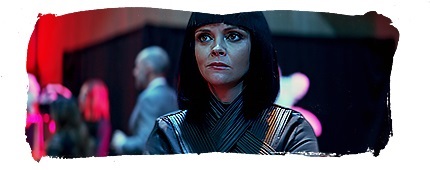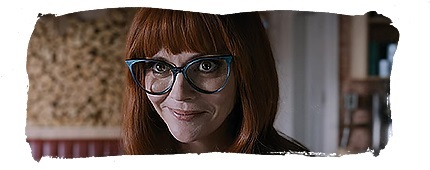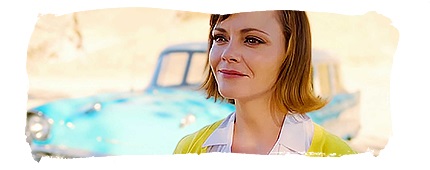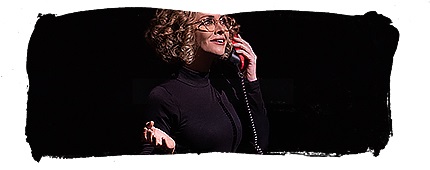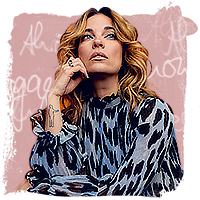
|
01
Mar 2007
Webmiss
|
I have no idea what a “Black Snake Moan” is, but I do know what “Christina Ricci naked and chained to a pole” means. It means that I will be seeing this movie. The fact that BLACK SNAKE MOAN also stars Samuel L. Jackson and is directed by Craig Brewer (HUSTLE & FLOW) is nice, but they had me at “Christina Ricci naked.” Ricci recently stopped by the Hyatt Century Plaza in Los Angeles to talk about going all the way to the edge in BLACK SNAKE MOAN. Check it out.
What was it about this character that made you decide to go so far?
Well, I think there are millions of women like Rae out there and the link between childhood sexual abuse and promiscuity in women and low self worth and post traumatic stress and low self esteem. That link has been well established. And when I read the script, she was such an honest representation in a way without judgment on that kind of person and I thought, ‘oh, it’s so great to see someone who’s not sugar coated’ because that implies judgment.
Then when I started doing more research about survivors of childhood sexual abuse and really understanding and reading testimonials and statistics and really understanding what she would be suffering from and the pain and fears and anxieties that were really her motivating emotions. I just felt so much compassion for her and felt really compelled to kind of protect her by playing her.
How comfortable were you with playing a person like that?
Well, it’s not uncomfortable when you’re playing them. It’s uncomfortable to get into character because for me that’s somebody who expresses themselves and views the world in a polar opposite way than I do. But once I did all that research and I really understood where all these behaviors were coming from, those emotions are so strong that they’re kind of the easy ones to get lost in because they are so strong and overwhelming. So it was difficult to kind of get into that mode of always seeing everything through this anxiety and this fear. But then once I was in that place, all the mannerisms and everything were really motivated from all that emotion and then once I was there, it wasn’t that hard.
Sam Jackson mentioned that he eventually got used to having you hanging around the set almost naked all the time. Did you ever imagine that’s something people could get used to?
Well they had to. It was really necessary for the crew to be used to it because I was playing someone who has no sense of her body and places no value on her body. Her body has never done anything but cause harm and she has no regard for herself so she wouldn’t care if she were clothed or not. And as an actress, when you’re playing someone like that, I think it’s inappropriate for you to have any kind of vanity.
And I needed to lose any sort of self consciousness because I feel sometimes you can see self consciousness in a performance when somebody is naked or in a nude scene and I really needed for that not to be there so to help me, I stayed the way I would be for the scene all the time in order to get the crew really used to seeing me that way so that I was comfortable — not only was I comfortable but I would look at anybody’s face and not see them uncomfortable — because if someone else is uncomfortable, it makes you feel like you’re doing something wrong.
How long did it take for you and Sam to establish the level of trust you had with each other?
It was pretty immediate. He and I, immediately once we were doing rehearsals, kind of realized that we were going to work really well together and that we could really trust each other. I was so flattered by that because I’ve loved him for so long and I was kind of intimidated and kind of felt like, “God, I hope he likes me and I hope he thinks I’m a good actress.” So when I realized that he trusted me and respected me and I, of course, already trusted and respected him, it was amazing and to be able to rely on each other like that and know that we were in each other’s hands and in really good hands and you can be really vulnerable with that person, it was such a great feeling. It’s rare to have a partner like that in those scenes where you can just lose yourself because you know you’re in someone’s hands who cares about you and will take care of you.
What kind of research did you do?
I have read over time and you see a lot about this occurrence, and this sort of phenomena of women being created this way unfortunately and having this be the response to sexual abuse. The first thing I wanted to look at was this nymphomania idea and so I did research online and found out that nymphomania is basically a defunct word and any psychiatrist worth their salt will tell you that it basically means nothing now except that it’s a male fantasy. There is sex addiction but nymphomania is really not something that’s really widely used. It’s like calling someone “crazy.” It doesn’t mean anything really.
But then I went back and looked at, okay, what is she probably suffering from? And what she would have been suffering from, what fits the description, post traumatic stress is the thing which best fits what she’s going through. And if you think about it, if she’s a child who everyday is being sexually abused, then everyday she’s living with this dread and fear knowing something’s coming, knowing it’s going to happen at some point. And ironically the only time that she experiences relief or calm is after the abuse has occurred because it’s when at least she can relax knowing it’s not going to happen again until the next day.
So when someone’s suffering from post traumatic stress, they’re experiencing the same emotions long after the event has stopped. So it could be 40 years ago but you still feel that same kind of anxiety and stress of waiting for the abuse to occur. And if the only way she ever found relief before was from the abuse, now she’s an adult with this horrifying, crippling anxiety and fear. She’s got to then become almost her own abuser because no one’s ever taught her another way to get any kind of relief or release from her pain.
So she creates these situations of degrading, anonymous, painful sex and that’s her way of abusing herself and creating at least momentary relief. And also, when I was reading tons of testimonials, there’s a lot you read expressed by many individuals that they’d rather die than ever be raped again. And so you can kind of understand her saying this is never going to happen to me again and it’s not going to happen to me again because I’m going to do it to myself first.
What was it like working with Justin Timberlake?
I thought he was great and Justin is so much fun to be around. He’s really silly and goofy and we had a great time on set. And I was really, really impressed with his acting. He was great. He really connects with other actors in the scenes and he could do a lot of things that took me years to learn how to do. (laughs)
He used to make fun of me because I can’t dance and I asked him to teach me how to “pop and lock,” and apparently popping and locking are two different things. So that’s nonsense basically — popping and locking. And I was like, “Oh, okay, well then never mind.” (laughs) So I never got my dance lesson because popping and locking doesn’t mean anything. It’s nonsense.
How about that world of the South that the film inhabits? How did you prepare for that world?
Before I went down there I learned an accent, as one does. My assistant at the time was born and raised in Memphis and her sister happens to be a linguist, so even for my audition she put all my dialogue on tape and I listened to it. And then when I got the part, she read the whole script onto a tape and I listened to the scenes before I’d go out and do them. But when you’re in that situation, when you’re down in the South and you’re surrounded by Southerners every day and working, you start to just act like and speak like and feel like a Southerner and there’s definitely a different kind of calm and laid back. It’s just different. I don’t know how to express it really. I’m totally a Northerner through and through, but when I was down there and surrounded by people, it’s very infectious.
How would you describe the relationship between Rae and her mother? Do you think that’s the cause for her being how she is?
Well not only was she abused her whole life, but she was abandoned by the one person who was supposed to love her and that abandonment would have occurred when her mother allowed her stepfather to do what he did to her. And then to not be validated in what happened. That’s also extremely abusive to not validate somebody else’s painful, abusive experience. So that has a lot to do with her not ever having experienced any unconditional love and that’s really the thing, I think, that Lazarus gives her is this sort of unconditional love and respect and the basic respect that you just give another human being which she’s never really been given. And I think that’s what enables her to stop identifying herself with her past and sort of see a different person, see the person he sees.
Was it an easy decision to make this movie? Did you just decide, “I want to do this movie?”
Yeah, I did. I felt so strongly about Rae and about the experience that she and millions of others have survived and I felt a huge moral responsibility to do this and to do it right and to give it really the attention and the weight that it deserved. And also I wanted to give her the dignity that had been stripped from her. In reading testimonials, one of the biggest things that I read over and over again is that what these people felt as children was rage at this humiliation. All of a sudden their dignity was taken from them. And then the rage continues and how can you expect me to behave with any dignity when you’ve stripped me of it. So I really wanted to give that back to her in a way and protect her by playing her.
Did you learn anything from Craig in regards to his vision of the South?
I know he’s very influenced by Tennessee Williams and I’ve always been a big Tennessee Williams fan so we talked about that and how that’s a big influence on the way he sees the South.
Was it hard to decompress from playing such a damaged character?
It was harder to get into character. Once you’re coming out of the character, I think that’s something that just slowly happens the more you start to look like yourself again, the more you’re in your own home again. And it was kind of funny because, you know, I’m a prude and I do not like walking around naked and I was in my bathroom about two months after the movie finished and I was brushing my teeth and I was in my underwear and I looked down and it was like, ‘oh, god, put something on.’
And then I just stopped and thought, ‘oh my god, I was half naked for two months and my ass was on camera.’ So I called my sister and I was like, ‘oh my god, I can’t believe… Is it okay? I’m freaking out’ and she’s like, ‘no, no, it’s okay, you were playing a part.’ But it’s so interesting how when you come out of character and you become yourself again, you’re sort of like, ‘oh, wow, uh… I guess that’s okay.’ (laughs)
Are you concerned that some male viewers might watch you in that role and get kicks watching it when they should instead be feeling sorry for the character?
Yeah, I mean that is my concern but because those kinds of men exist, we have child rapists and rapists and those are the people who create this problem and so I have concerns about them even beyond how they react to this film.
You looked great. Did you do anything special to get in shape physically for this role?
Oh, thank you. I actually wanted her to look really unhealthy and like someone who didn’t take care of herself. The more you get into character, the easier it is to neglect yourself because she neglects herself. Someone mentioned something about looking like you’ve only been fed sugar your whole life so I started to eat only sugar and it kind of worked because I look really unhealthy in the movie. (laughs)
What kind of things did you eat?
Sugar. (laughs)
What do people say to you about the poster and the kind of image that it portrays?
Well I feel like this movie has to be dissected from the inside out and at the very heart of this film is a story about two people who are in an incredible amount of pain who, by finding each other, manage to help each other heal. And then, as an actor, that’s how we look at it. And then the director comes and has a certain kind of style and vision that he wants to shoot the movie in…One of the themes for me making this movie — and I know I talked to Craig about it and he agreed – was this idea of the exploitation of women.
And what I thought was so important about this film and what this film showed really well was how she’s been exploited her whole life to the point where she swallowed the exploitation and now as an adult she’s exploiting herself. And we used iconic images to sort of dress her in reference to these iconic, exploitive images. It’s showing how women are now regurgitating the exploitation that they are being put through. So that’s a lot of what that kind of thing in the film is about and I think that’s what the poster is about as well.
From JoBlo.com












